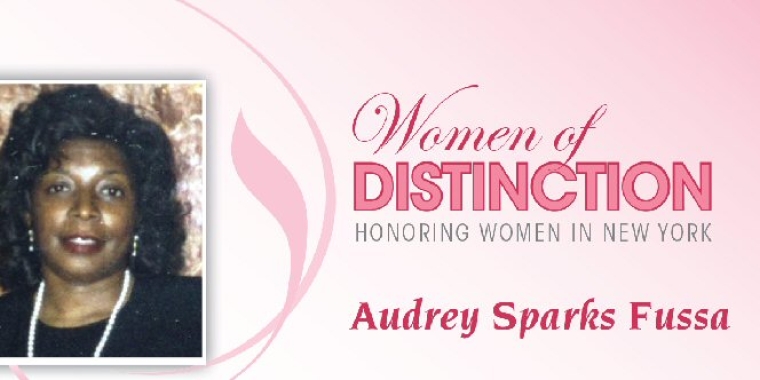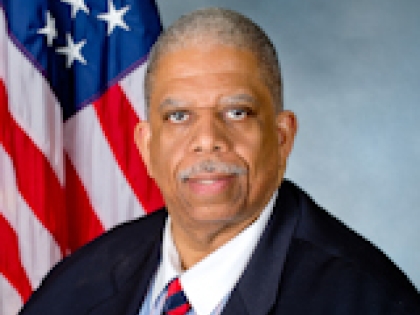
SPRINGFIELD GARDENS COMMUNITY RALLIES TO SAVE LOCAL BANK
Contact: Stacey Eliuk
October 6, 2015
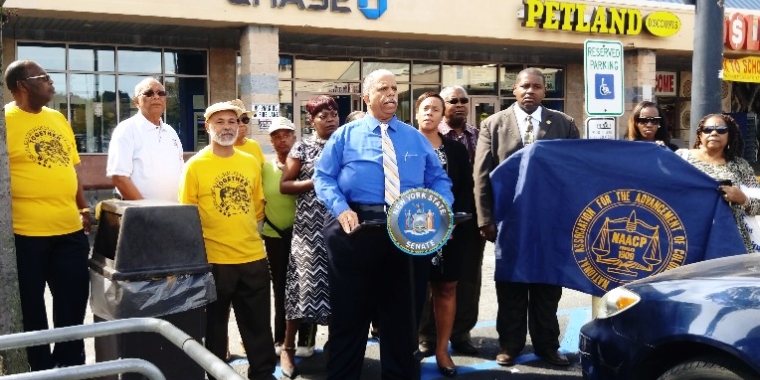
(Springfield Gardens, Queens) Today, Springfield Gardens residents joined State Senator Leroy Comrie (D-St. Albans) to rally against the proposed closing of its neighborhood Chase Bank branch at 134-40 Springfield Boulevard. Senator Comrie organized this rally in response to a swell of community protest that began since the announcement of its closing approximately two weeks ago.
The Chase branch, long a fixture in the community’s daily life, is an accessible location for seniors, a place of business for professionals, and an integral component of the economic vitality of the shopping center. It provides needed services to a largely minority community in lieu of check cashing businesses, which charge fees to patrons for the same services a bank would provide for free as part of an account. Located in a highly trafficked shopping center, its location is safer than two nearby Chase Banks, both of which have been robbed at least once in the last two years. Further, the plaza will soon welcome the conversion of a brand new Stop and Shop supermarket, one of the premiere “mega supermarkets” of the borough, bringing new customers and financial incentive for Chase to stay.
The rally was a largely community-driven effort that Senator Comrie responded to after receiving scores of phone calls and complaints to his office. A majority of the residents that reached out the Senator did so on behalf of their seniors, who rely on the bank’s location to access their finances both safely and conveniently. The shopping center accommodates residents with free accessible parking, a major grocery store, a municipal credit union, a walk-in clinic and other local shops, and is a lifeline for the elderly, many of whom have limited means of transportation and need one-stop shopping. Although Chase argues that there are other branches nearby, both of those locations (one at 231-02 Merrick Boulevard, robbed twice this summer; the other at 188-39 Linden Boulevard, robbed once in 2013) have been the site of violent encounters in the last two years.
Close accessibility to the credit union and other stores allows City and State workers to pay bills and manage their finances in a responsible and timely way. Businesses in the plaza fear that the branch’s closing will drive down their own foot traffic, which is augmented by the customers the bank draws in.
Although financial services are now available to access in numerous ways besides physical bank branches – for instance: ATMs, online banking, banking by phone – a bank branch continues as an vital physical and figurative presence of a financial institution. For low-income communities, physical access to a bank branch remains important, for it is at a bank branch that people can have direct contact with employees, programs, and products to ask for guided knowledge on how best to manage finances.
During his tenure in the City Council, Senator Comrie worked on legislation known as the Responsible Banking Act, which studied the role financial institutions play in different types of neighborhoods in order to call for better banking practices in low-income and minority communities. Before being overturned in a Bankers Association Lawsuit, initial findings saw that minority communities typically experienced lower bank branch location density per population – as attested to by neighborhoods like Southeast Queens. Findings showed that much of the region averaged 1.2 branch locations per 10,000 people, significantly lower than the City average of 2.2 locations. In many instances, where there is a gap in accessibility to banking branches, check cashing facilities emerge as a primary source of services, typically at a higher cost to the customer than that of a banking institution.
Senator Comrie called upon Chase to reverse its decision in light of both community need and financial opportunity: “As not only the representative of this community but a loyal customer of Chase bank, I see the vital function it plays every day in keeping commerce flowing. Evidence points to the great financial potential of this community: instead of pulling out, Chase should recognize its very real possibility to be the fiscal and commercial hub of Southeast Queens.”
“A closure of this Chase branch is a net negative for both our community and the bank. Southeast Queens is a community that has been historically underserved by such financial institutions. The very proof of this fact was evidenced in the early findings of the Responsible Banking Act, before it was struck down in a Bankers Association lawsuit,” said Council Member I. Daneek Miller (D – St. Albans). “The under-representation of financial institutions in Southeast Queens gives an existing bank like Chase a competitive advantage – they have great name recognition and less competition in regards to accessing our local residents, their potential clients. In a community like ours, comprised of homeowners, middle to upper income families, and a growing commercial district in Downtown Jamaica, it’s puzzling from a business perspective that Chase would want to reduce their presence in Southeast Queens. It is my hope that the bank will realize this branch’s significance to local residents, as well as our community’s contribution to the institution, and that the business will remain open.”
Alicia Hyndman, Democratic nominee for Assembly District 29, shared her thoughts: “Chase not long ago made a promise to this State to work with the feedback communities provide to improve business relations and help local economies. This is the exact antithesis of that. Before Chase closes this branch, they need to seriously reconsider the community’s need and their own responsibility to act in good faith to minority communities.”
“One of the main things that stabilize the community are their banks,” said Leroy Gadsden, President of the NAACP Jamaica branch. “This bank is a FDIC bank – meaning that their services should be available for everyone. If Chase bank wants our business across America and all the benefits that come with being federally recognized, they should be sharing services with the minority community. Not doing so is a form of economic discrimination. We expect the same type of service in the black community as everywhere else.”
“We hope that Chase will not abandon this community and remain a fixture for all who rely on it,” Senator Comrie finished.
###
Share this Article or Press Release
Newsroom
Go to NewsroomComrie's Corner—March 21, 2017
March 30, 2017
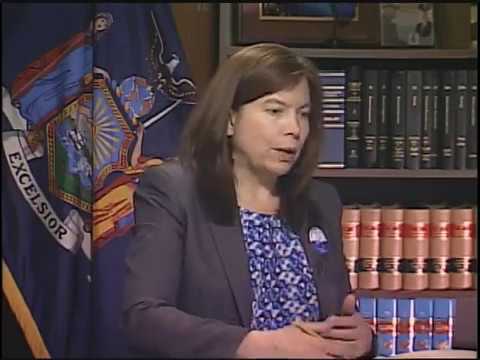
THANKSGIVING ESSAYS AND CONTRIBUTIONS SD 14
November 22, 2016

Willie Burks
May 20, 2016
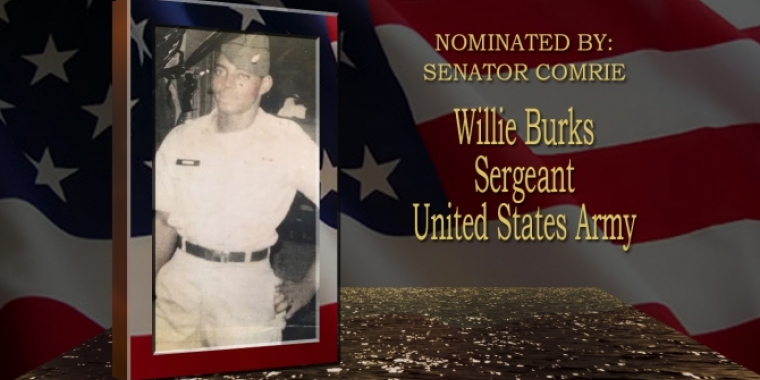
Audrey Sparks Fussa
May 11, 2016
